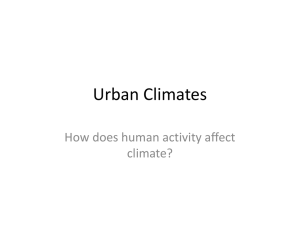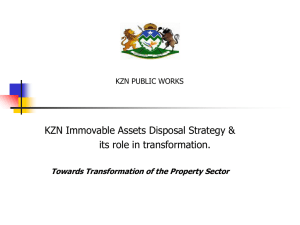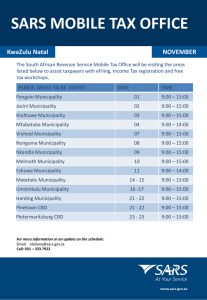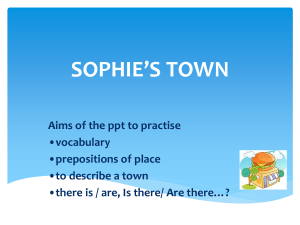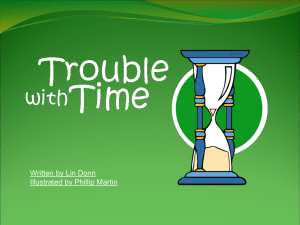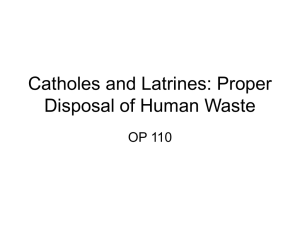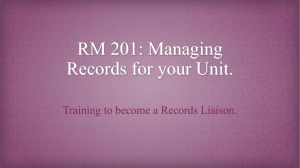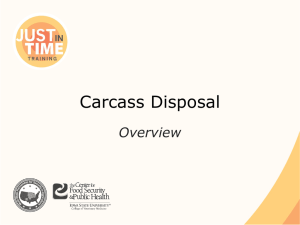Capital Budgeting Presentation
advertisement
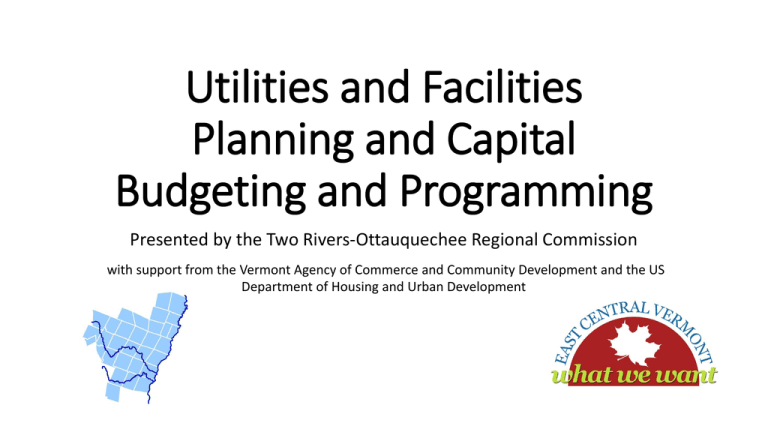
Utilities and Facilities Planning and Capital Budgeting and Programming Presented by the Two Rivers-Ottauquechee Regional Commission with support from the Vermont Agency of Commerce and Community Development and the US Department of Housing and Urban Development Why do a Utilities and Facilities Plan and a Capital Budget and Program? • Planning is good. • Planning for major purchases and for major repairs ensures a thoughtful process and the ability to gather cost and other data. • Important decisions are made with community input and agreement. • Planning for services important to the community helps preserve them. • Budgeting for purchases allows for the creation of reserve accounts and other methods to keep tax rates roughly stable. Crawl before you run, we all start small • Start simple • Add a few things each year • Don’t sweat the dinky stuff (<$5,000) • Good project for Planning Commission in “off” years • Delegate parts to relevant departments • Auditors or Budget Committee can help out • Can operate on a cash basis from annual appropriations or be sustained through reserve accounts that help to levelize costs What are these two things, who does them, and how do they relate? Town Plan (24 VSA sections 4382-85) 1. must contain a utilities and facilities element (note that Transportation is a separate element, so the roads/sidewalks/trails/services are covered there) 2. is developed in public, adopted after public hearings 3. written by the Planning Commission, reviewed and approved by the Selectboard (or town vote). Capital Budget and Program (24 VSA sections 4325, 4430, 4443) 1. Builds on the plan 2. The budget is for one year, the program for 5 years 3. Developed by the Planning Commission and adopted by the Selectboard The Utilities and Facilities Plan: Let’s break it down Title 24 § 4382(a)(4). The plan for a municipality shall include the following: • (4) A utility and facility plan, consisting of a map and statement of present and prospective community facilities and public utilities showing existing and proposed educational, recreational and other public sites, buildings and facilities, including hospitals, libraries, power generating plants and transmission lines, water supply, sewage disposal, refuse disposal, storm drainage and other similar facilities and activities, and recommendations to meet future needs for community facilities and services, with indications of priority of need, costs and method of financing; Where to start? Title 24 § 4382(a)(4). The plan for a municipality shall include the following: map • (4) A utility and facility plan, consisting of a and statement of present and prospective community facilities and public utilities showing existing and proposed educational, recreational and other public sites, buildings and facilities, including hospitals, libraries, power generating plants and transmission lines, water supply, sewage disposal, refuse disposal, storm drainage and other similar facilities and activities, and recommendations to meet future needs for community facilities and services, with indications of priority of need, costs and method of financing; The Map • Show the current and proposed utilities, buildings, sites and facilities on a map. This is usually done only within the boundaries of the town, but could also be done more regionally to show the nearest hospital, the regional high school you use, etc. • educational, recreational and other public sites, • buildings and facilities (including hospitals, libraries, power generating plants and transmission lines, water supply, sewage disposal, refuse disposal, storm drainage and • other similar facilities and activities What to write? Title 24 § 4382(a)(4). The plan for a municipality shall include the following: statement of present and prospective community facilities and public utilities showing existing and • (4) A utility and facility plan, consisting of a map and sites proposed educational, recreational and other public , buildings and facilities, including hospitals, libraries, power generating plants and transmission lines, water supply, sewage disposal, refuse disposal, storm drainage and other similar facilities , and recommendations to meet future needs for community facilities and services, with indications of priority of need, costs and method of financing; and activities The List It is not just an inventory of present buildings Could include vehicles Services Utilities But it is not just a list . . . Title 24 § 4382(a)(4). The plan for a municipality shall include the following: • (4) A utility and facility plan, consisting of a map and statement of present and prospective community facilities and public utilities showing existing and proposed educational, recreational and other public sites, buildings and facilities, including hospitals, libraries, power generating plants and transmission lines, water supply, sewage disposal, refuse disposal, storm drainage and other similar facilities and activities, and recommendations to meet future needs for community facilities and services, with indications of priority of need, costs and method of financing; It’s recommendations and priorities • It is recommendations on the future desires for all of the things on the list, some of which you may not currently have. • Though not mentioned in the beginning § 4382(a)(4), “services” are mentioned later in the section as needing to be considered for recommendations, so you might as well put them on the list from the start. • Though not called for in the statutory language, you should also consider major pieces of equipment. After all, the fire engine may well cost as much as the fire station. • Needs versus Wants • Don’t just talk about the new, talk about the things to keep. • In deciding on priorities, the public process of a town plan is a great tool. Outside of the plan, towns still must hold at least one hearing. Survey sheets can be filled out by different people or agencies and then made into text. The Town Garage was built in 1973 and has several heated bays. It has its own sewer and water and has sufficient space to maneuver vehicles. A sand pile, covered salt pile, diesel fuel tank, and chloride tank are on site. The only issue identified with the site is that the sand pile area is unavailable during frigid weather and so a smaller space with perhaps an enclosed pile could be built for residents’ use. This could be built as a volunteer project. $$$$$$$$$$ Title 24 § 4382(a)(4). The plan for a municipality shall include the following: • (4) A utility and facility plan, consisting of a map and statement of present and prospective community facilities and public utilities showing existing and proposed educational, recreational and other public sites, buildings and facilities, including hospitals, libraries, power generating plants and transmission lines, water supply, sewage disposal, refuse disposal, storm drainage and other similar facilities and activities, and recommendations to meet future needs for community facilities and services, with indications of priority of need, costs and method of financing; Show me the money • Rough costs are needed • Timeframes are needed • Is money necessary? Can you do it with volunteers and donations? • What kind of money? Taxes? Grants? Bonds? • This is where the power of capital budgeting and programming comes in Capital Budget and Program Title 24 § 4430 • (a) A capital budget shall list and describe the capital projects to be undertaken during the coming fiscal year, the estimated cost of those projects, and the proposed method of financing. A capital program is a plan of capital projects proposed to be undertaken during each of the following five years, the estimated cost of those projects, and the proposed method of financing. Who does the Capital Budget and Program? • § 4325. Powers and duties of planning commissions • Any planning commission created under this chapter may: • (6) Prepare and present a recommended capital budget and program for a period of five years, as set forth in section 4440 of this title, for action by the legislative body, as set forth under section 4443 of this title; Planning Commission’s Role • Assist the Selectboard by; • Consolidating budgets from all town departments • Review and discuss needs of each department, work plans, goals, etc. • Deliver to the Selectboard/Town Manager a draft Capital Budget for consideration. Who does the Capital Budget and Program? • Title 24 § 4443. Adoption, amendment, or repeal of capital budget and program • (a) Notwithstanding any other provision of this chapter, a capital budget and program may be adopted, amended, or repealed by the legislative body of a municipality following one or more public hearings, upon public notice, if a utility and facilities plan as described in subdivision 4382(a)(4) of this title has been adopted by the legislative body in accordance with sections 4384 and 4385 of this title. • Need for a Hearing, could be several, should be several! • Transparency of budget process and revisions are key. • Selectboard has the final say. Reserve accounts • Title 24 § 2804. Reserve funds; use • (a) At an annual or special meeting duly warned, a municipality may establish a reserve fund to be under the control and direction of the legislative branch of the municipality. The reserve fund shall be kept in a separate account and invested as are other public funds and may be expended for such purposes for which established, or when authorized by a majority of the voters present and voting at an annual or special meeting duly warned, for other purposes. Example. Your town is looking to purchase a new truck in ten years. At today’s price the new truck would cost $315,000 Simply dividing the cost over ten years would equal: =$315,000 Factoring in a 4% inflation rate to the cost, and using that, gives you more money for higher future costs. + 4% + 4% + 4% + 4% + 4% + 4% + 4% + 4% + 4% =$466,277 You can then use an equal annual amount as above, which is stable, or use a progressively larger amount which may be easier to fund if the tax base is growing, but is harder to figure out. =$466,277 Possible Reserve Funds • Road equipment or a single vehicle • Buildings or just the Town Hall • Recreation Areas • Trees and Parks • Emergency Services or just the main fire engine • Water Systems • Sewer Systems Example of several costs from a single reserve with a level annual input Questions? For follow-up please contact Chris Sargent csargent@trorc.org or Kevin Geiger kgeiger@trorc.org or call 802-457-3188 Prepared by: Randy Clark, Intern and Kevin Geiger, Senior Planner Two Rivers-Ottauquechee Regional Commission


